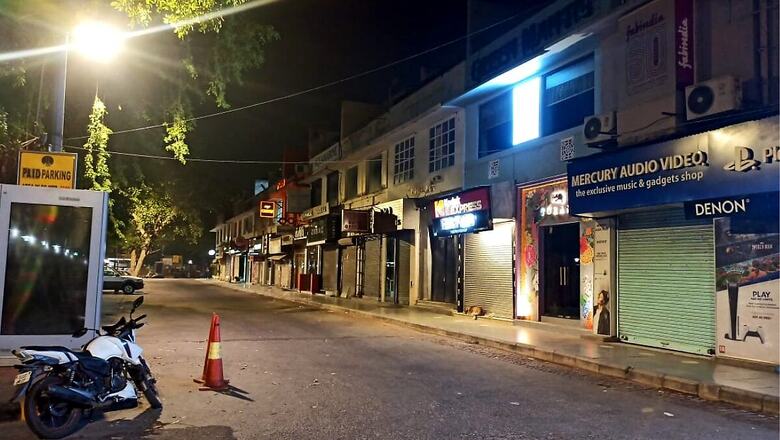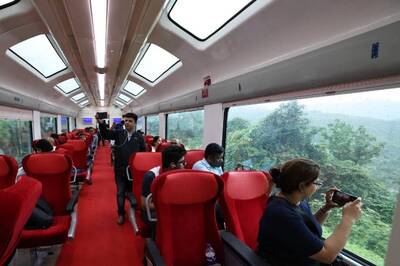
views
On Tuesday, Delhi became the latest state to join the night curfew bandwagon due to the rising Covid-19 cases in the capital. Earlier Maharashtra, Punjab, Odisha, Rajasthan and Gujarat had imposed night curfews either fully or partially.
But do the night restrictions help arrest the coronavirus infection?
On May 17, 2020, while extending the nationwide lockdown, the Centre had announced enforcement of 12 hours night curfew between 7 pm and 7 am which was later relaxed from 10 pm to 5 am before being dropped in Unlock 3.0 from August 1 last year.
However, between the same period total Covid-19 cases in the country rose by over 16 times, from 95,698 cases on May 17 to 16.3 lakh cases on July 31, 2020.
Many feel night curfews are futile given the fact that crowded public places like markets, malls etc. are already closed by 10 pm.
“Night curfew, leave alone the timing is fragmented, it’s a piecemeal approach, unscientific, and a band aid on large gangrene lying elsewhere….and the gangrene is as far as the superspreader events are concerned which are markets, are open through the day; all the political and religious gathering, …these are a big no-no at present time,” Dr Sanjeev Bagai told CNN-News18.
However, professor K Srinath Reddy, president of Public Health Foundation of India (PHFI), sees some merit in the move. “Night curfew can be justified on some practical and some theoretical grounds,” professor Reddy says, explaining that such curfews “prevent indoor gatherings for parties, celebrations and restaurant dining which can become superspreader events.”
“Theoretically, the virus is less easily dispersed in the cooler night air and can hang closer to the ground in viral clouds. Low levels of ultraviolet light at night also increase virus survival outdoor,” Reddy says, explaining the relationship between virus behaviour and the timing of the curfew.
However, it is mainly to prevent crowded indoor events that night curfew is intended, he says.
On the argument that curfew between 6 pm to 10 pm would have been a better idea to stop the coronavirus spread as people rush out to market at the time, Reddy feels, “A curfew between 6 to 10 pm will hamper working families from making essential purchases after work and not prevent late night indoor celebrations, meetings and parties.”
“Crowding outdoor in daytime carries less risk than crowding indoor at night time. Both types of crowding should be avoided. In all cases, masks must be worn by everybody, without exception,” he concluded while laying emphasis on the essentiality and centrality of face mask in containing the infection.
Among others who doesn’t see much merit in the night curfew is union health minister Dr Harsh Vardhan. “Physical distancing is an established non-pharmaceutical intervention to suppress the transmission of Covid. “In this context, partial lockdowns such as night curfews or weekend lockdowns would not have much impact on transmission,” Vardhan recently said at a media conclave.
Besides, cities like Delhi and Mumbai are country’s economic lifeline and any restriction will definitely hurt the green shoots and recent economic recovery.
“I am unable understand in what way night curfew is going to stop the coronavirus spread in Delhi,” says Praveen Khandelwal, founder and general secretary of the Confederation of All India Traders or CAIT.
Lamenting the night curfew, Khandelwal says, neither the Maharashtra government not the Kejriwal government consulted them before making the decision.
“We, as traders, are also concerned and want to cooperate with government but as far as night curfew clamping in concerned, we feel that it is not going to serve any purpose, rather it will have an adverse effect particularly on traders like restaurants, banquet halls, farm houses,” Khandelwal says.
On Tuesday, CIAT in a letter addressed to Union Home Minister Amit Shah requested to get trade association on board before taking any decision regarding curfews.
The letter requested Shah not to overlook the economic ramifications of any lockdown while exploring other available avenue for virus containment. The CIAT has pegged loss of Rs 1 lakh crore per month due to night curfew in Maharashtra alone.
“After whole of the 2020 was wasted, now the industry is trying to recover from the losses of previous lockdowns and at this point of time clamping a night curfew is certainly not going to serve any purpose,” Khandelwal spoke to News18.
Khandelwal further makes an offer to the Delhi government. He says, “in case the government agrees, trader’s associations in collaboration with Delhi Police and NCT administration could join hands and our volunteers will show how social distancing could be enforced without going for any curfew or lockdown.” We are writing to LG of Delhi to convene a meeting with trade associations, Khandelwal said.
Experts also feel that government is caught between rock and a hard place and there’s not much options to choose from. Covid cases are rising at record pace. Closing down of the whole economy would be a terrible idea, especially at a time when economic growth has started picking up. At the same time, saving precious lives is equally important.
Vaccination has picked up some pace but inoculating 1.3 billion population will take a long time. Till then, preventive approaches like night and weekend curfews, and strict punitive action for protocol violation is the only way out, say experts.
Read all the Latest News, Breaking News and Coronavirus News here. Follow us on Facebook, Twitter and Telegram.


















Comments
0 comment